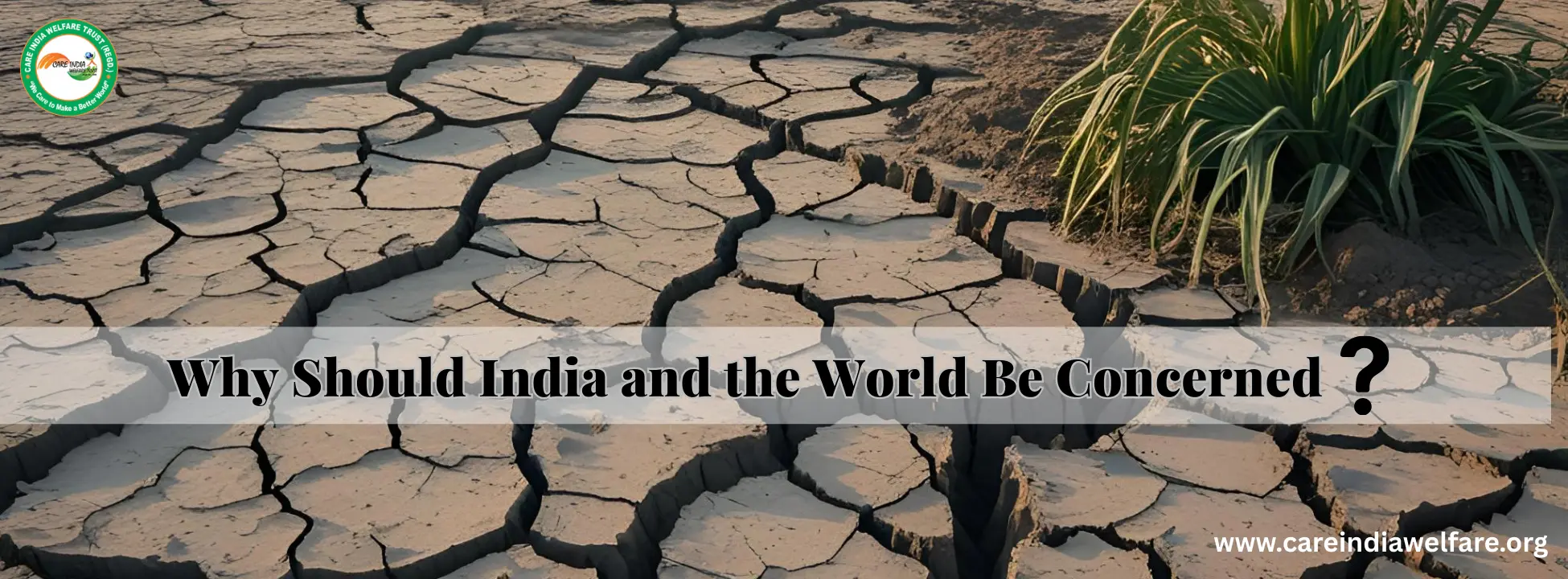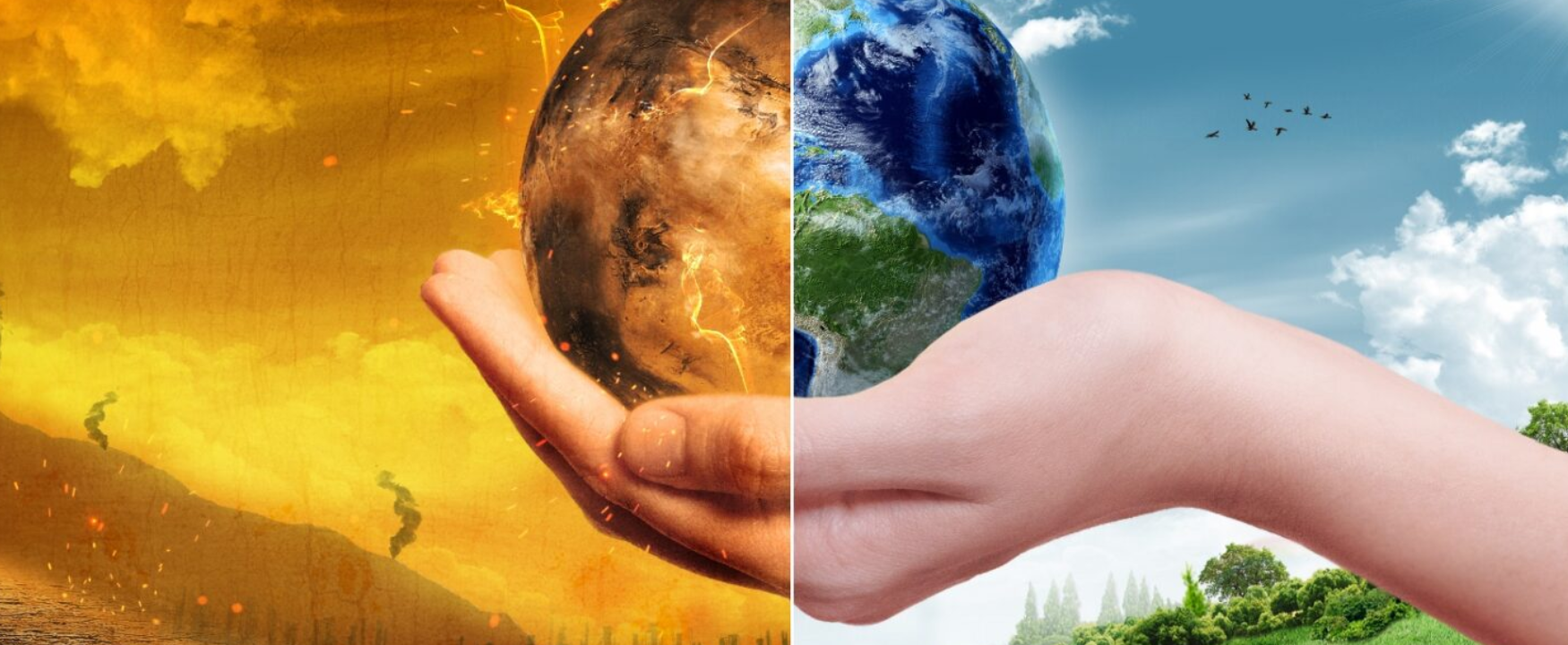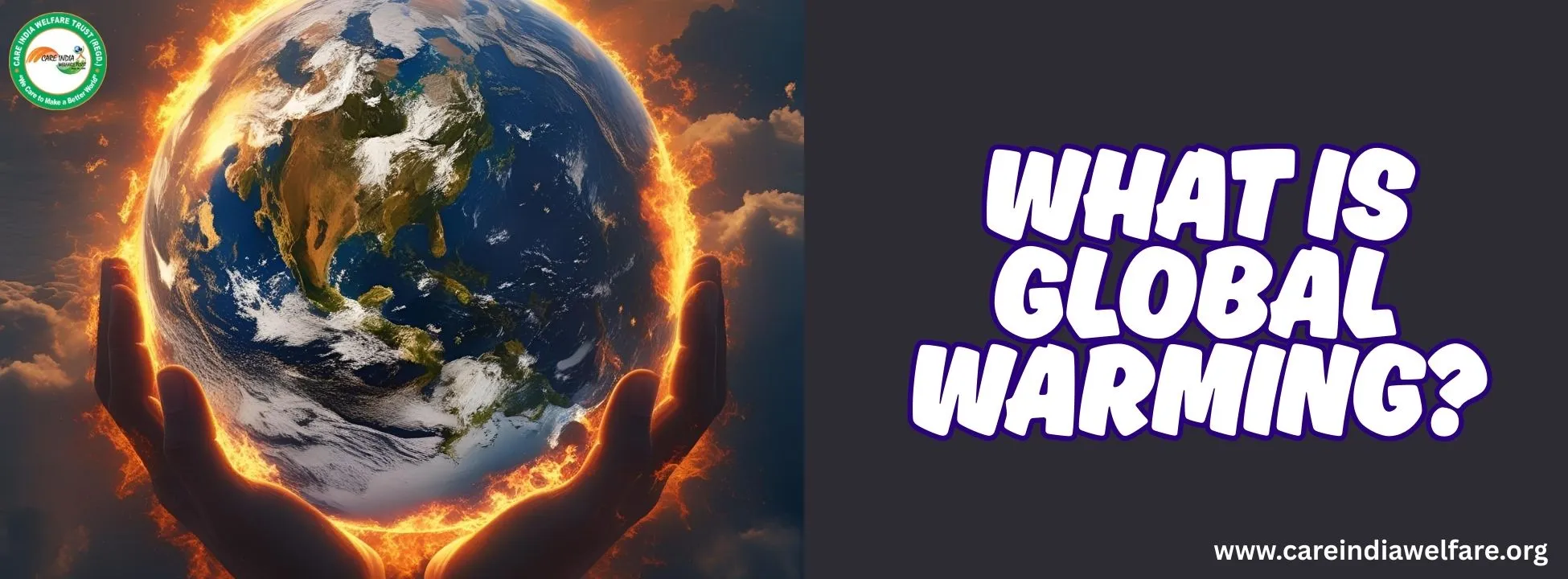Introduction: The Climate Crisis Is Real
The climate crisis is no longer in the future; it is an emergency today. The planet is warming at a rapid pace, causing changes to the environment that are disturbing life as it. Thawing polar ice caps, record-breaking heat waves, devastating floods, and
Rising sea levels are visible indicators of global warming. Such incidents are not sporadic—they're the direct result of rising greenhouse gas emissions due to human activity. Scientists have been warning us for a long time that unless we take action, these impacts will only intensify. Now, their prognosis is coming true. Global average temperatures have risen by 1.1°C from the 19th century, and we're witnessing their consequences in ecosystems, economies, and communities.
At Care India Welfare Trust, we understand that social progress and environmental stewardship are two sides of the same coin. The world's poorest communities bear the greatest brunt of climate change—they experience poor air, crop loss, and a shortage of clean water. That is why we've incorporated environmental awareness into our larger purpose.
This is a call to action. As a vulnerable country exposed to the impacts of climate change as well as a critical country for the solutions of the world, India has to step up and lead the way. We aim to inform, motivate, and mobilize individuals—policy makers and citizen activists alike—toward effective change. The time is not tomorrow; the time is now. Collectively, we can reduce the harm and create a brighter future for everyone.
What Is Global Warming?
Global warming is the gradual increase in the planet's average surface temperature over time as a result of increasing amounts of greenhouse gases in the atmosphere. The gases—carbon dioxide (CO₂), methane (CH₄), nitrous oxide (N₂O), and fluorinated gases—are emitted primarily through human-related processes like the combustion of fossil fuels (coal, oil, and natural gas), deforestation, industrial processes, and agriculture.
When the sun's rays hit the Earth, some of them get absorbed and the rest get reflected into space. Greenhouse gases retain this heat in the atmosphere, similar to a blanket that covers the Earth. This is the greenhouse effect. Though a natural process for life, human-emitted gases have amplified the effect, leading to a rise in temperatures globally abnormal.
The Earth's warming can appear insignificant, but even a 1°C increase can cause catastrophic effects such as heatwaves, glacier melts, higher sea levels, and intense storms. All these disrupt weather, farm output, and natural habitats.
It is important to understand global warming because it makes us aware of how we contribute to it, and more significantly, what can be done to stop it. Basic knowledge of where greenhouse gases are produced and how they build up can help governments, corporations, and individuals make better, responsible choices. The fight against global warming begins with knowing its causes and consequences, and subsequently taking swift, collective action to diminish our carbon footprint.
The main contributors to global warming include:
- Fossil Fuels: Used for electricity, heating, and transportation, fossil fuels are the largest source of CO₂.
- Deforestation: Trees absorb CO₂. When forests are cut down for agriculture or urban expansion, we lose this natural carbon sink.
- Agriculture: Livestock produce methane, a potent greenhouse gas, and the use of nitrogen-based fertilizers releases nitrous oxide.
- Industrialization: Manufacturing processes emit various pollutants and rely heavily on non-renewable energy.
Understanding the mechanisms behind global warming is key to recognizing the urgency of the issue and the need for collective, meaningful action.
Why Should India and the World Be Concerned?
India is one of the countries most vulnerable to the impacts of climate change. With its vast population, agricultural dependence, and rapidly developing economy, the consequences of global warming are already being felt across the nation.
- Extreme Events: India is witnessing more frequent and intense heat waves, floods, cyclones, and droughts. In recent years, cities like Delhi have seen record-breaking temperatures, while regions like Kerala have faced devastating floods.
- Agricultural Crisis: Agriculture employs more than 40% of India’s workforce. Erratic rainfall and rising temperatures are damaging crops, reducing yields, and pushing farmers into poverty and debt.
- Health Risks: Climate change is worsening air quality and increasing the spread of vector-borne diseases like malaria and dengue. Poor and marginalized communities often suffer the most due to limited access to healthcare.
- Water Scarcity: Glacial melt and erratic monsoons are leading to severe water shortages in both rural and urban areas. By 2030, India’s water demand is expected to be double the supply.
- Threat to Biodiversity: Ecosystems across India—from the Sundarbans to the Western Ghats—are under threat. Rising temperatures and habitat loss are pushing many species toward extinction.
- Impact on Marginalized Communities: Women, children, the elderly, and low-income populations are disproportionately affected due to their limited resources and mobility.
India’s situation underscores why global warming is not just an environmental issue but a development, economic, and humanitarian crisis.

What Can We Do?
Tackling global warming requires a united effort across all levels of society. Solutions must be multifaceted—policy reforms, corporate responsibility, and individual lifestyle changes all play a role. Here’s how we can act:
Policy & Advocacy
Policy and advocacy entail advocating for legislation and policies that deal with climate change. Governments need to wake up to the climate crisis and establish robust environmental legislation that limits emissions and promotes renewable energy. From Global Warming Vol 24 Warm Up 8, climate justice has been demanded by scientists and activists. It is a wake-up call climate change moment—policymakers need to make green reforms a priority. Civil society and NGO advocacy can bring about change at a global and national level. Good policies guarantee systemic answers, so global warming is an alarm signal not only for politicians but for all of humanity to save our planet.
- Push for Renewable Energy: Governments must invest in solar, wind, and hydroelectric power, reducing dependency on fossil fuels.
- Strengthen Environmental Laws: Enforce strict emission norms and penalize industries that flout environmental guidelines.
- Sustainable Agriculture: Promote climate-resilient crops, organic farming, and water-efficient irrigation systems.
Corporate Responsibility
Corporate Responsibility requires firms to behave ethically and promote the welfare of the environment. In light of global warming—a call to action for humankind—firms have to embrace sustainable practices such as minimizing carbon footprints, relying on renewable energy, and issuing environmental performance reports. Industrial expansion has been a primary source of emissions since the commencement of global warming in 1800. Now, when climate change has become an international crisis, corporations need to wake up to climate and own up. Corporate decisions today are essential in turning around the harm and making humanity serve meaning, not profits alone, but people and the planet equally as well.
- Green Infrastructure: Businesses should build eco-friendly workplaces with energy-efficient designs.
- Reduce Carbon Footprint: Adopt sustainable supply chains and green logistics.
- Environmental Reporting: Encourage transparency through sustainability audits and ESG (Environmental, Social, Governance) disclosures.
Individual Action
Individual action matters deeply in tackling climate change. Every step—reducing plastic use, conserving water, cycling instead of driving—contributes to healing the Earth. Since global warming began accelerating post-1800, individual lifestyles have had an increasing impact on emissions. This is a global warming wake-up call moment. Each of us must see climate action as part of humanity's service, meaning—serving people and the planet. Whether it’s joining a tree plantation or choosing sustainable brands, these are the building blocks of climate recovery. It’s time to wake up to a call for change, as climate change doesn’t wait. We must act now.
- Conserve Energy: Use LED lights, energy-efficient appliances, and switch off electronics when not in use.
- Say No to Plastics: Reduce single-use plastics, carry reusable bags and bottles.
- Adopt Sustainable Transport: Use bicycles, public transport, or electric vehicles.
- Plant Trees: Trees absorb CO₂ and cool the environment.
- Save Water: Fix leaks, use water-saving fixtures, and harvest rainwater.
Every action counts. Change begins with awareness but must move swiftly into action.
What Care India Welfare Trust Is Doing
At Care India Welfare Trust, we understand that combating climate change is part of caring for the communities we serve. That’s why we’ve integrated environmental awareness into our core mission. Here’s what we’re doing on the ground:
- Tree Plantation Drives: We organize large-scale tree plantation campaigns in urban and rural areas. Not only do trees reduce CO₂ levels, but they also provide shade, improve air quality, and support biodiversity.
- Clean Energy Awareness: Through workshops and community programs, we promote the use of solar energy, biofuels, and other renewable sources, especially in underserved regions where electricity is scarce or unreliable.\
- Climate Education: We partner with schools to educate children about climate change, sustainability, and environmental stewardship. Our school programs include eco-clubs, composting projects, and green classrooms.
- Resilience Training: We help rural communities build resilience against climate impacts by promoting sustainable farming, water conservation, and early disaster preparedness.
- Green Campaigns: On special days like World Environment Day and Earth Day, we run awareness campaigns through street plays, posters, and social media to amplify the message of environmental protection.
By blending grassroots action with education and advocacy, Care India Welfare Trust is nurturing not only the people but also the planet.
Final Thoughts: Our Earth, Our Responsibility
We are at a turning point in human history. The climate crisis is no longer a distant threat—it is unfolding around us every day. From wildfires and floods to rising temperatures and vanishing wildlife, the signs are clear. Our current way of living is harming the planet, and if we don't act now, future generations will face irreversible consequences.
But there is still hope. Every individual, organization, and government has the power to make a difference. Small changes in our lifestyles—like using less plastic, conserving water, choosing public transport, or planting trees—can collectively create a big impact. We must move from awareness to action.
At Care India Welfare Trust, we view climate action not just as an environmental duty but as a moral responsibility. Climate change hurts the poorest the most—those who contribute the least to the problem. By taking action, we are protecting their rights, health, and livelihoods. Fighting global warming also means fighting poverty, hunger, and inequality.
Governments must invest in clean energy and enforce strict environmental laws. Corporations must embed sustainability into their core practices. And we, as citizens, must make conscious choices that are kinder to the planet. Every effort matters.
Time is running out. The longer we delay, the harder and costlier it will be to reverse the damage. But together, we can still build a greener, safer, and more just world. Join us. Volunteer, donate, educate, and live sustainably. The Earth is not just our home—it is our shared legacy.
The climate clock is ticking. Let’s not wait for more disasters to shake us into action. Join us in this mission—volunteer, donate, educate, and most importantly, live sustainably.
Together, we can build a greener, safer, and fairer world.
FAQ
Is Global Warming Real?
So, yes, global warming is happening. The Earth's temperature rises because of pollution and greenhouse gases. This causes heat waves, melting ice, floods, and destruction for human beings, animals, and nature.
Why is Global Warming The Biggest Threat We are Facing?
Because of extreme weather, rising sea levels, food and water shortages, and many other consequences, global warming is definitely the greatest threat confronting mankind and the animal kingdom, while nature suffers in the process from one end of the globe to the other.


